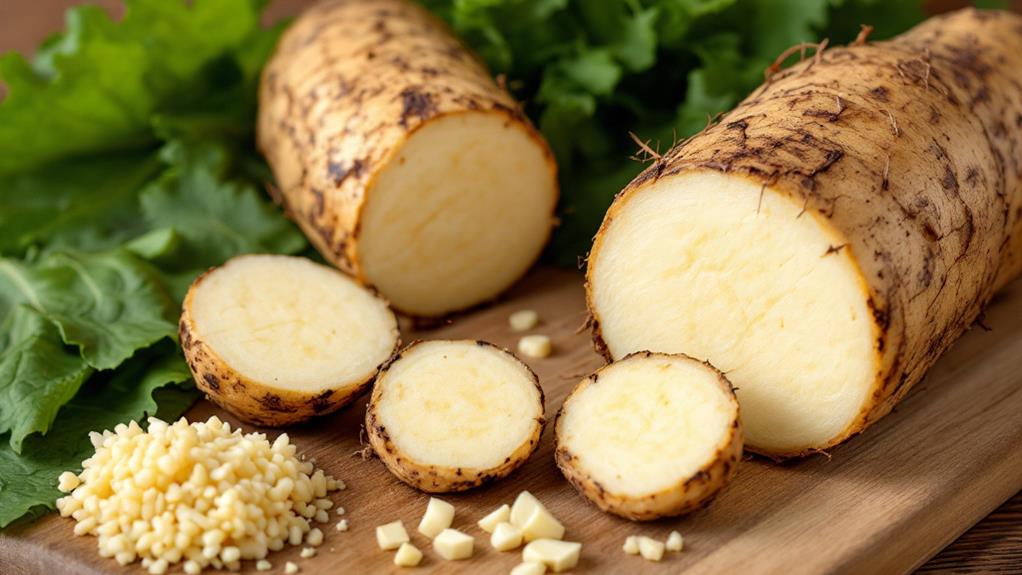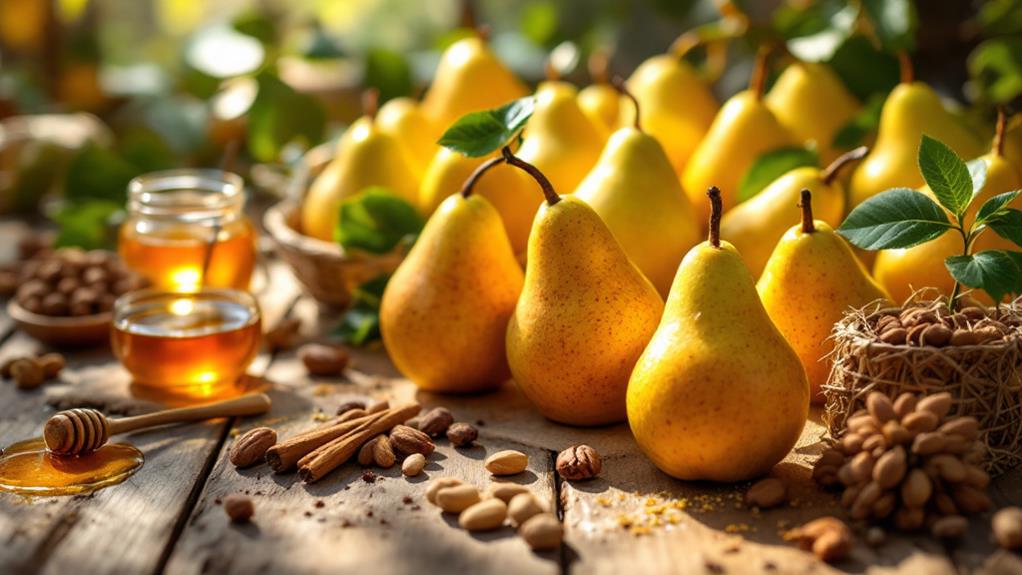The Lesser-Known Cashew Fruit: Benefits and Uses
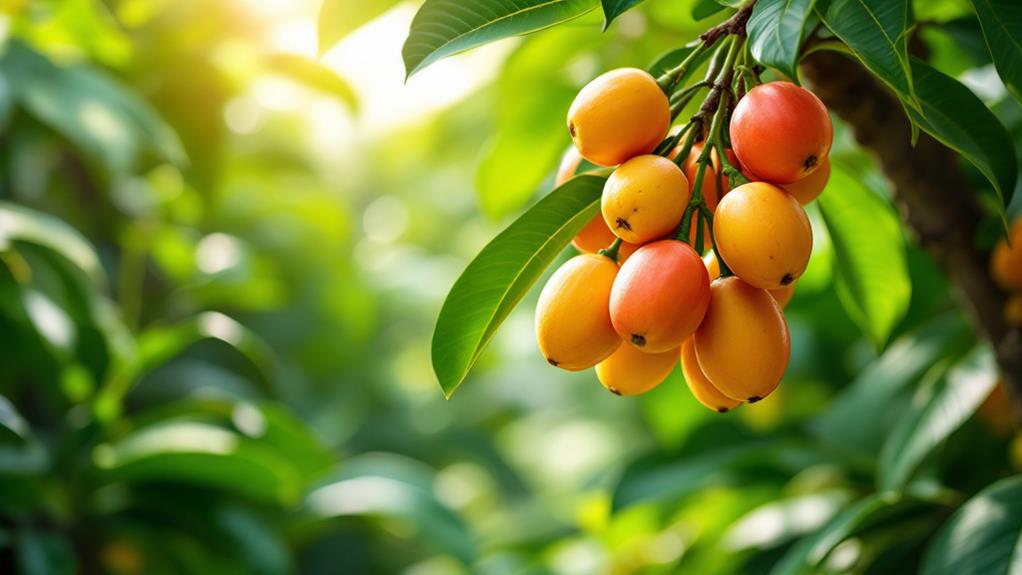
Uncover the cashew fruit's untapped potential. This lively pseudocarp isn't just eye-catching; it's packed with vitamin C, carotenoids, and flavonoids that offer antioxidant and antimicrobial benefits. You can enjoy its sweet-sour taste fresh, make juice or even investigate traditional beverages like feni. Its rich nutritional profile supports your immune system, eye health, and helps manage cholesterol. However, be mindful of potential allergies and urushiol in the shell. Innovations in processing aim to reduce waste and create value-added products. There's much more to reveal about this versatile fruit's benefits and culinary possibilities.
Understanding Cashew Fruit
Regarding understanding cashew fruit, it is essential to recognize that the cashew apple is not actually a true fruit but a pseudocarp. This lively, sweet-sour treat ranges from yellow to bright red, depending on its ripeness, and offers more than its appealing color. Rich in vitamin C, carotenoids, and flavonoids, the cashew apple provides antioxidant properties that are beneficial for your health. These nutrients contribute antimicrobial and antitumor effects, making the cashew apple a powerhouse of nutritional benefits.
Incorporating cashew fruit into your diet can be both nutritious and adaptable. Thanks to its natural sugars, it's a delightful option for direct consumption or different culinary uses. You can investigate its potential by creating preserves or turning its juice into wine. Fermented cashew apples play a significant role in producing traditional beverages like feni, a popular choice in some regions.
Despite its advantages, a staggering 90-95% of cashew apples are wasted annually. This emphasizes the need for increased utilization and development of value-added products to reduce waste. By examining creative ways to use cashew apples, you contribute to sustainability while enjoying its myriad benefits.
Distinctive Characteristics
Moving from the broader benefits and uses of cashew fruit, let's investigate its distinctive characteristics. The cashew apple stands out with its juicy texture and lively colors ranging from yellow to red, depending on ripeness. Its sweet-sour flavor, combined with a unique floral aroma, makes it appealing for culinary use and decoration. Rich in vitamin C, the cashew apple provides approximately 190 mg per 100 g, offering a significant enhancement to your diet and increasing its nutritional value.
You're getting more than just a tasty treat with the cashew apple. It contains high levels of sugars, including fructose and sucrose, alongside dietary fiber, flavonoids, and carotenoids. These components not only contribute to its nutritional profile but also provide health benefits, such as aiding digestion and offering antioxidant properties.
The cashew apple's adaptability is remarkable. Beyond direct consumption, it's used in producing juices, jams, and even alcoholic beverages. Its nutritional richness extends to animal feed, proving its utility beyond human consumption. Regardless of whether you're enjoying it fresh or as part of another product, the cashew apple's distinctive characteristics make it an intriguing and valuable enhancement to diverse uses.
Culinary Applications
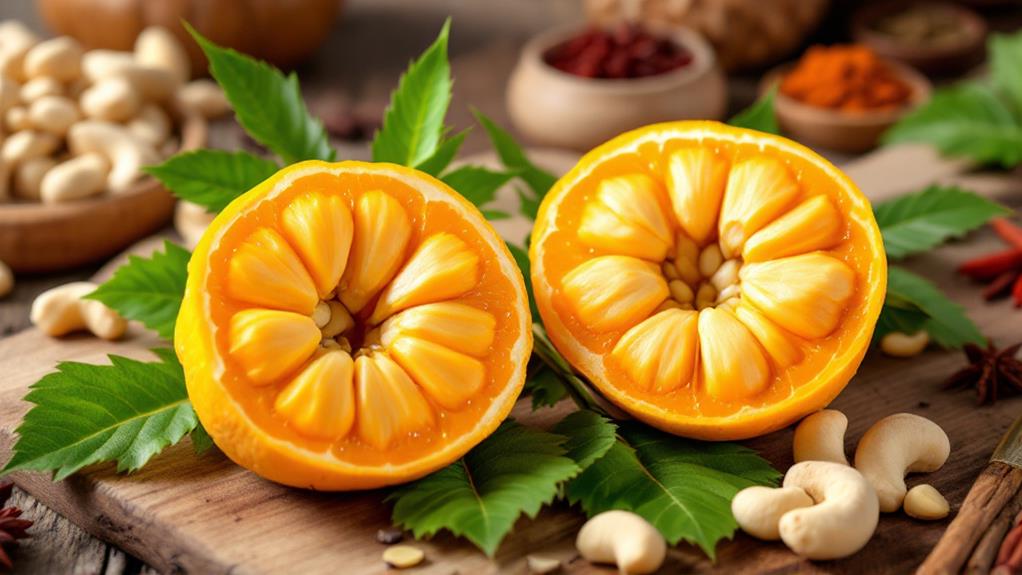
The cashew fruit, or cashew apple, boasts an impressive array of culinary applications that raise dishes with its unique flavor profile. You can cook cashew apples, toss them into salads, or preserve them with sugar to improve their taste and prevent spoilage. This versatility makes them a fantastic supplement to diverse recipes, allowing you to investigate new flavors in your kitchen.
Extracting juice from cashew apples offers a revitalizing drink, perfect for quenching thirst. If you're adventurous, ferment this juice to create traditional alcoholic beverages like feni, a beloved drink in Goa and Maharashtra. The culinary versatility of cashew apple pulp shines in sweets too. Try using it in desserts like dulce de maranon, where its natural sweetness enriches confections beautifully.
Beyond drinks and sweets, cashew apples can transform into vinegar through fermentation, adding a tangy twist to dishes. Its distinct flavor profile can raise your culinary creations, providing an unexpected depth. Don't overlook its lively colors and floral aroma for garnishing. The cashew fruit's appeal in presentation and taste can improve your dishes, making them both visually appealing and delicious. Accept the potential of this lesser-known fruit in your culinary adventures.
Nutritional Profile
Investigate the impressive nutritional profile of the cashew fruit, and you'll uncover why it's a powerhouse of health benefits. Known as the cashew apple, this lively fruit is an excellent source of vitamin C, offering approximately 190 mg per 100 g. This high vitamin C content enhances your immune function, keeping you resilient against common ailments. Moreover, vitamin C contributes to skin health, making the cashew apple a beauty enhancer as well.
The fiber-rich cashew apple aids digestion and promotes gut health, thanks to its strong dietary fiber content. This fiber helps maintain a smooth digestive process, ensuring your body's systems are running efficiently. Furthermore, the fruit is packed with antioxidants, including carotenoids and flavonoids, which help combat oxidative stress and protect your cells from damage.
You'll also find important minerals in cashew apples, which contribute to holistic nutritional balance and well-being:
- Potassium supports heart and muscle function.
- Magnesium aids in maintaining healthy nerve and muscle function.
- Iron plays a vital role in oxygen transport and energy production.
Incorporating cashew apples into your diet can provide a delightful enhancement in both taste and nutrition.
Health Advantages
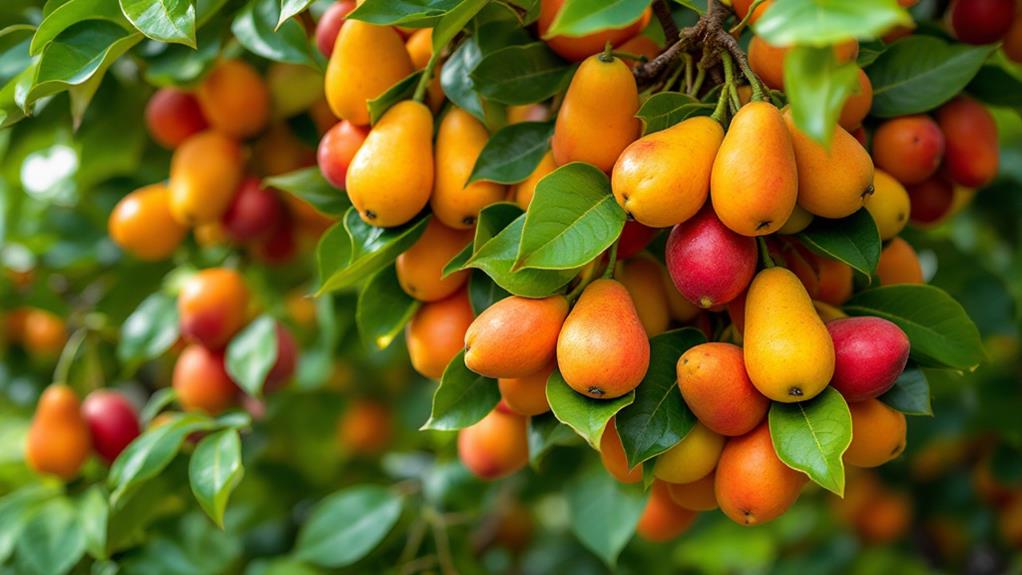
Adopting the health advantages of cashew fruit reveals its significant impact on your well-being. Packed with vitamin C, cashew fruit plays a essential role in enhancing your immune system, protecting you from infections. The abundance of antioxidants in cashew fruit further improves your body's defense mechanisms, ensuring that you're well-guarded against free radicals. This superfruit also possesses proanthocyanins and flavonoids, which can inhibit cancer cell replication, potentially reducing your risk of colon cancer and supporting general cellular health.
Cashew fruit doesn't stop there—it's an excellent source of zinc, which is important for a strong immune response. Zinc promotes quicker healing and recovery from illness, helping you bounce back faster. Moreover, the healthy fats found in cashew fruit contribute to cholesterol management and support cardiovascular health, lowering your risk of heart disease. By incorporating this fruit into your diet, you're taking steps toward better heart health.
For eye health, cashew fruit is rich in lutein and zeaxanthin, which protect against UV damage and reduce the risk of cataracts. Include cashew fruit and enjoy its remarkable health benefits as part of your wellness experience.
Consumption Methods
Regarding enjoying cashew fruit, you'll find numerous tasty consumption methods that highlight its unique flavor and nutritional benefits. The cashew apple offers a delightful sweet-sour flavor and juicy texture, making it perfect for fresh consumption. If you're looking to extend its shelf life, you can cook or preserve the fruit with sugar, transforming it into delicious jams, jellies, or sweet spreads. These options not only improve its sweetness but also make it a versatile supplement to your pantry.
Cashew apple juice is another fantastic way to enjoy this fruit. Thanks to its high vitamin C content, it becomes a wonderful ingredient in assorted culinary applications, from invigorating cocktails to nutritious smoothies. Its distinctive flavor adds a zesty twist to any beverage.
Consider these creative uses for cashew fruit:
- Fermentation: Turn the cashew apple into traditional beverages like feni, an alcoholic drink popular in Goa and Maharashtra.
- Desserts: Use the pulp to create sweets like dulce de maranon, a delightful treat for those with a sweet tooth.
- Beverages: Incorporate the juice into cocktails or smoothies for a burst of flavor and nutrients.
Embrace the cashew apple in your culinary adventures!
Potential Side Effects
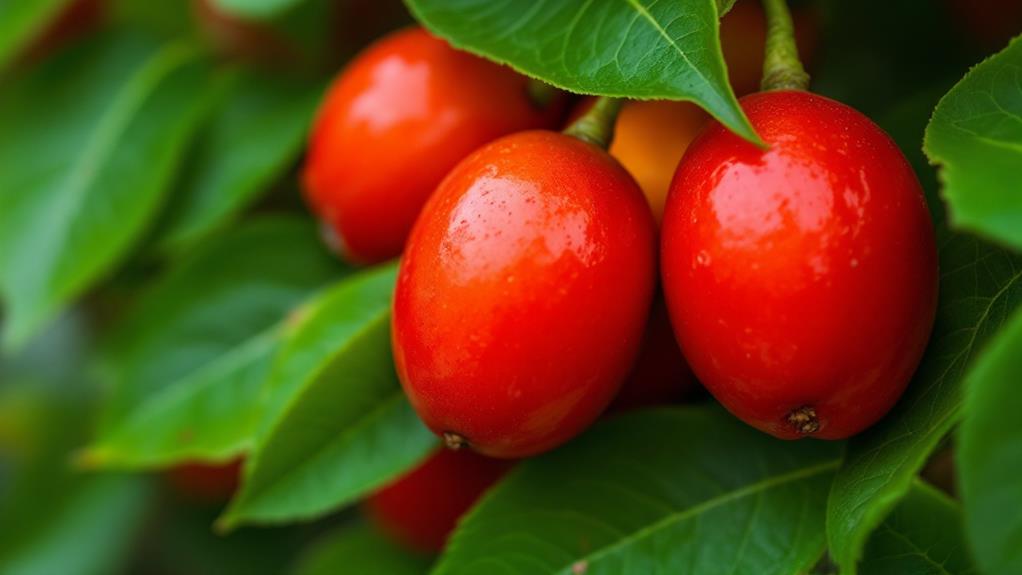
When enjoying cashew fruit, be aware of potential side effects that could arise from overconsumption. This tropical delight, while generally safe, has a high carbohydrate content, which might lead to bloating, constipation, and weight gain if eaten excessively. It's essential to consume it in moderation, especially if you're watching your weight or managing diabetes, as high intake might raise blood sugar levels.
Additionally, if you have a nut allergy, exercise caution. Allergic reactions, including anaphylaxis, can occur, especially if you're sensitive to cashew or other tree nuts. Cross-reactivity is possible, so it's best to consult with a healthcare provider if you're unsure. It's not just about ingestion; even the unroasted cashew nut, part of the cashew fruit, can cause skin irritation or blistering due to urushiol, a toxic oil in the shell.
For those who are pregnant or breastfeeding, the safety of consuming cashew fruit isn't well-established. Moderation is key, and it's wise to discuss any dietary changes with your doctor. Staying informed helps you enjoy cashew fruit safely while minimizing potential risks.
Innovations and Future Research
Emerging techniques in cashew fruit processing are transforming the way we harness its nutritional benefits. With a focus on innovations, researchers aim to extract more nutritional components like flavonoids and carotenoids, which are packed with health benefits. One of the most exciting areas is the development of value-added products from cashew apples. These include juices, jams, and even alcoholic beverages, which not only offer new flavors but also tackle the massive post-harvest waste issue—currently up to 95% of production.
Imagine the possibilities:
- Creating delicious and healthy cashew apple products
- Reducing waste and increasing economic returns for farmers
- Enhancing antioxidant activities through new processing techniques
Future research is also diving into the antioxidant, antimicrobial, and antitumor activities of cashew fruit extracts, promising exciting health benefits. On the agricultural side, sustainable practices and advanced breeding techniques like Marker Assisted Selection (MAS) are paving the way for high-yield and disease-resistant varieties. These efforts don't just elevate the global supply chain but also support farmer livelihoods. By embracing these innovations, you can be part of a movement that celebrates both the taste and potential of cashew fruit.

